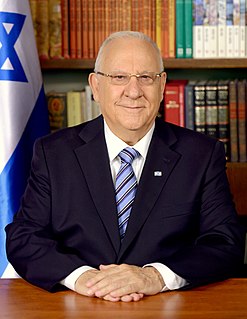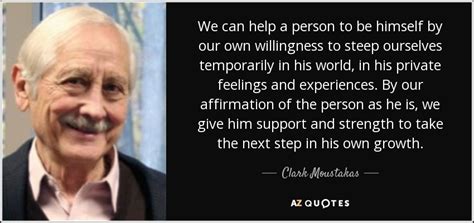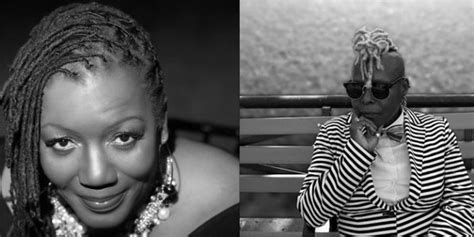A Quote by Manly Hall
Each person must discover his own philosophy of life, and it is not fair or right to impose our codes upon others. It is also our responsibility, however, to share, one with another, such experiences as may have common value.
Related Quotes
Our inner strengths, experiences, and truths cannot be lost, destroyed, or taken away. Every person has an inborn worth and can contribute to the human community. We all can treat one another with dignity and respect, provide opportunities to grow toward our fullest lives and help one another discover and develop our unique gifts. We each deserve this and we all can extend it to others.
To say that it is not our fault does not relieve us of responsibility. However, we may not have polluted the air, but we need to take responsibility, along with others, for cleaning it up. Each of us needs to look at our own behavior. Am I perpetuating and reinforcing the negative messages so pervasive in our culture, or am I seeking to challenge them?
Since we must and do write each our own way, we may during actual writing get more lasting instruction not from another's work, whatever its blessings, however better it is than ours, but from our own poor scratched-over pages. For these we can hold up to life. That is, we are born with a mind and heart to hold each page up to, and to ask: is it valid?
First of all, although men have a common destiny, each individual also has to work out his own personal salvation for himself in fear and trembling. We can help one another to find the meaning of life no doubt. But in the last analysis, the individual person is responsible for living his own life and for "finding himself." If he persists in shifting his responsibility to somebody else, he fails to find out the meaning of his own existence. You cannot tell me who I am and I cannot tell you who you are. If you do not know your own identity, who is going to identify you?
It requires something more than personal experience to gain a philosophy or point of view from any specific event. It is the quality of our response to the event and our capacity to enter into the lives of others that help us to make their lives and experiences our own. In my own case my convictions have derived and developed from events in the lives of others as well as from my own experience. What I have seen meted out to others by authority and repression, economic and political, transcends anything I myself may have endured.
Does the open wound in another's breast soften the pain of the gaping wound in our own? Or does the blood which is welling from another man's side staunch that which is pouring from our own? Does the general anguish of our fellow creatures lessen our own private and particular anguish? No, no, each suffers on his own account, each struggles with his own grief, each sheds his own tears.
Freedom, by its nature, must be chosen, and defended by citizens, and sustained by the rule of law and the protection of minorities. And when the soul of a nation finally speaks, the institutions that arise may reflect customs and traditions very different from our own. America will not impose our own style of government on the unwilling. Our goal instead is to help others find their own voice, attain their own freedom, and make their own way.
The great secret of morals is love; or a going out of our nature, and an identification of ourselves with the beautiful which exists in thought, action, or person, not our own. A man, to be greatly good, must imagine intensely and comprehensively; he must put himself in the place of another and of many others; the pains and pleasure of his species must become his own. The great instrument of moral good is the imagination.
With only one life to live we can't afford to live it only for itself. Somehow we must each for himself, find the way in which we can make our individual lives fit into the pattern of all the lives which surround it. We must establish our own relationships to the whole. And each must do it in his own way, using his own talents, relying on his own integrity and strength, climbing his own road to his own summit.
I must conclude that Conscience, if that be the name of it, was not given us for no purpose, or for a hindrance. However flattering order and expediency may look, it is but the repose of a lethargy, and we will choose rather to be awake, though it be stormy, and maintain ourselves on this earth, and in this life, as we may, without signing our death-warrant. Let us see if we cannot stay here, where He has put us, on his own conditions. Does not his law reach as far as his light? The expedients of the nations clash with one another: only the absolutely right is expedient for all.
We can not communicate with the Lord if we do not communicate with each other. If we want to present ourselves to him, we must take a step towards meeting one another. To do this we must learn the great lesson of forgiveness: we must not let the gnawings of resentment work in our soul but must open our hearts to the magnanimity of listening to others, open our hearts to understanding them, eventually to accepting their apologies, to generously offering our own.
Writers are given the responsibility of sight. I think that the whole burden, responsibility and beauty of the gift forces us to construct our lives differently so that we are able to become vehicles to transcend, to encompass and articulate not only our own experience but the experiences of others.









































